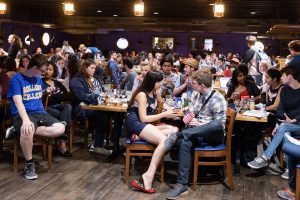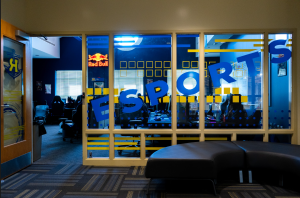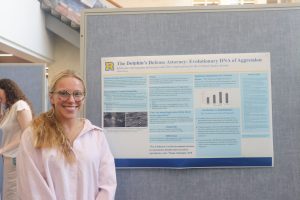
We emailed this letter on March 30, 2017, to President Cornwell who forwarded it to several administrators. We have had follow-up meetings with several people on campus. We have reprinted the letter below to inform the campus community on the steps the students are taking.
To President Cornwell and whom it may concern:
We planned Thursday’s Tars Talk event out of our feelings of confusion and disappointment in the college’s response to the ‘fake news’ situation regarding a student and his Muslim professor. Since few facts of what actually happened between the student and professor are known, we focused our conversation on the spread of fake news, the college’s response, and the activity on social media. We felt that it would be appropriate to hold a discussion for students and faculty members regarding the issue, because we saw our own concerns and fears reflected in many members of the student body—this was highlighted by the almost 120 people that attended Thursday’s discussion.
Two of the biggest issues that kept being re-emphasized were transparency and communication. Many students felt confused and scared that the administration did not promptly respond publicly to the incident. Many students seem to feel that your email to the campus community was insufficient. Though we understand that the email was intentionally vague due to legal reasons, its timing and content seemed to only increase negative student feelings because of its ambiguous nature. In the future, if similar issues arise, we believe that it might be better to issue a more direct statement to students with whatever information can be provided. Something like this could note the legal/privacy issues, the media situation, and include a reassurance to students that there is no continuing concern of harm for the campus community.
A campus tour guide noted that she was unsure what to say to parents and prospective students when they ask about issues like this. Tour guides need to receive better instruction on how to handle these questions while displaying faith in our institution. Again, minimum communication on the issue of fake news would have assuaged many people’s fears. By providing a breakdown of the existing hierarchal nature of information dissemination, more transparent communication between the administrators and students might help students be more enthusiastic ambassadors of Rollins to prospective students.
The sentiment that we have heard echoed many times over the past week is that many current students are appalled that other students, community members, and alumni immediately took the Central Florida Post article at face value. Considering the college’s mission and its emphasis on global citizenship, this quick acceptance was understandably distressing to many of the community. This was made worse by the fact that many students—of the left and right—were belligerent when others did not understand their ideas on social media. Our event was mostly civil, and we suspect that this is due to the lack of students who spoke up in support of the student who was suspended; our event most likely attracted a mostly liberal and sympathetic audience. Though we are grateful we were able to give these people an avenue to express their ideas, further outreach should be considered for students who are probably feeling ostracized by the liberal nature of much of our campus.
Understandably, one student brought up a concern about the motivations of the Tars Talk. We decided to hold the event because of a fake news incident involving Muslim students, but there have been other bias incidents throughout the year, including the recent defacement of a poster for a Muslim event and KKK being written on a wall across the street from campus. These events deserve just as much attention as this recent issue, which was thrust into prominence by the fake news cycle. We would ask that instead of just reporting these events to the campus because of legal requirements, the administration should follow up and make sure that those who might be emotionally impacted by the events receive concern and care. A Muslim student reported that she felt support after the poster incident, but the same was not said for the recent KKK incident or the incident that our event was focused on. Making sure that students of diverse backgrounds feel accepted and safe on this campus should always be a priority.
There is obviously no room on a college campus for hate speech and discrimination, but there is room for education. Considering the proposed waiver of one of the neighborhood classes with the potential new ‘exploring’ system and the elimination of one requirement in the transition from the old general education system to the new neighborhoods system, we think that it might be ideal to add an additional class requirement to students’ required curriculum at Rollins. This idea was brought up during the Tars Talk and during our planning discussions. It seems inexcusable that some Rollins students and alumni, with their supposed education as global citizens, cannot tell the difference between fake news and real news. In addition, many members of the Rollins community find it impossible to have civil and respectful in-person conversations—instead hiding behind their social media accounts. A new class could combine the public speaking courses that are required at many other learning institutions with topics such as ethics, critical thinking, and education on different religions and tolerance.
We would like to thank everyone who helped us pull the event together so quickly. Campus Safety and the CICI staff were both wonderful, as were many other staff members and administrators. Also, we would like thank you for coming to our event and for your willingness to listen to our concerns. We are glad that we are able to help lead and participate in this conversation and that the administrators and faculty have been so supportive.
Our plan was to discuss the issues that this swirl of fake news brought to the surface and to give campus members an opportunity to express their thoughts and concerns, and we feel like we did that effectively. We truly hope that today’s discussion can mark the beginning of a better relationship between faculty members, administrators, and students as we all work together to make Rollins the community that we want it to be.
Sincerely,
Micah Bradley, Kamil Fadel, Sinead McDonald, SJ Renfroe, Sam Sadeh, and other concerned students












Be First to Comment